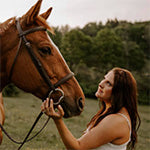It can be challenging to determine how much to feed your horse.
While it may seem easier to feed a horse by “scooping” volume instead of weight, this is not the most accurate method of portioning a horse’s food.
To accurately determine how much to feed your horse, you need to feed them by weight, not volume. This ensures a horse receives the proper quantity of nutrients.
In this article, you’ll learn how much to feed your horse and why horse feed should be weighed out rather than just “scooping” out an estimated volume of feed.
Determining How Much to Feed Your Horse
Before calculating how much to feed your horse, there are some important factors to consider.
First, how much a horse needs to be fed is partially determined by things like their age, breed, health status, and how much energy they expel daily.
As such, digestible energy should be considered based on these factors. Digestible Energy (DE) is the amount of energy in the horse’s diet that is absorbed by the horse. Digestible energy occurs from nutritional energy sources, like protein, fiber, starch, and fats found in a horse’s feed.
When considering how much digestible energy is in your horse feed, the caloric value reported for that feed is typically digestible energy.
Using the body condition scoring system (BCS) can also help you get a better baseline to determine if a horse needs more, less, or the same amount of feed in their diet. An average horse should have a BCS of about 5 - 6.
However, knowing your horse’s exact weight is also important when determining how much to feed them.
Most farms don’t have access to a livestock scale to weigh their horse, but it has become a common and acceptable practice to estimate a horse’s weight using the tape measure system.
In fact, research has shown that using this method provides fairly accurate results.
To Accurately Calculate a Horse's Weight:
- Have your horse stand on a flat surface.
- Measure the heart girth around the midsection of the animal, right behind the withers and elbow.
- Measure the length of the animal from the front of the shoulder to the point of the rump.
- Use the following equation to get an estimated weight: [(heart girth in inches)2 x length in inches)] 330
- As an example, suppose a horse has a heart girth of 77 inches and length of 68 inches:
- [(77)2 x 68)] ÷ 330 =
- [(5929 x 68)] ÷ 330 =
- 403,172 ÷ 330 = 1220 lb
Next, the type of feed your horse receives will also determine how much feed they need. Since not all horse feeds are created equal, the essential nutrients will vary, which is another reason why feeding by weight is so important.
Why You Should Weigh Horse Feed and Other Tips for Feeding Your Horse the Right Amount
One of the most important aspects when taking steps to feed your horse the right amount of horse feed is to ensure they are not underfed or overfed. Horse feeds will vary based on their nutrient content and how they are processed.
That’s why it’s vital to feed a horse by weighing their feed rather than by volume (i.e. a scoop). The exact weight of the feed given per day will depend on the quality of the forage and horse feed that’s fed.
For most horses, it’s recommended they receive 2-3% of their body weight in feedstuff per day.
For a 1200-pound horse, that would equal 24 to 36 pounds of feedstuff per day. Of this total, a minimum of 1.5% of their body weight should be forage. However, many horses will benefit from feeding above this minimum forage recommendation.
Additionally, if a horse starts to lose condition and drop weight, it would be recommended to slowly increase the weight of the feed being given each day, or switch to a product that is more calorie dense.
Alternately, if the horse’s weight begins to increase above an undesirable body condition score, it would be recommended you feed less of it each day.
If decreasing the horse’s feed due to weight gain results in the total daily intake being less than the minimum feeding recommendation, a switch to a less calorie-dense full intake horse feed, or a ration balancer, would be necessary to ensure non-energy nutrient requirements are still being met.
Explore Feed Options from Tribute® Equine Nutrition
Every Tribute® feed is made from the highest-quality ingredients, and even includes digestive support.
Tribute® focuses on being a reliable and affordable source of key nutrients for horses. Additional fortification using highly available sources of nutrients that are commonly lacking in equine diets, such as amino acids, trace minerals, and vitamins, help support horse health and performance.
Tribute® feeds also include Equi-Ferm XL®, a pre- and probiotic, as well as digestive enzymes to support optimal digestion. These enzymes enhance the digestibility of the horse feed portion of the diet, and Equi-Ferm XL® supports the fermentation in the hindgut. This maximizes digestibility of forage, which is the main source of dietary energy for the majority of horses.
Tribute® Superior Equine Nutrition has a number of horse feed options to suit the needs of the individual horse based on their health, age, and level of work.
All Tribute® feeds come with feeding directions and recommendations based on the weight and activity of the horse.
However, if you aren’t sure what feed or how much feed is best for your horse, reach out for a personalized feed plan that’s tailored to your horse’s specific needs and your goals.



